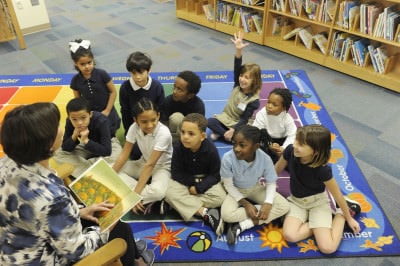

Ann Clark said she wanted to “put a face” on the work that happens inside the district’s 164 schools.
To do it, she turned to a host of students, employees, and community partners, who cheered the district’s accomplishments—and challenged its supporters to deepen their commitment to CMS.
“I am officially tapping you as ambassadors for CMS,” she told supporters who gathered at East Mecklenburg High School last week for the district’s State of Our Schools program. Historically, the address has been just that: a speech delivered by the superintendent in front of a crowd of businesspeople.
But Clark decided to challenge the conventional wisdom, holding the event at a school instead of in Uptown Charlotte, and tapping others to help deliver her message. The Charlotte-Mecklenburg Board of Education officially hired Clark as superintendent last Tuesday; she was running the district as deputy superintendent after Heath Morrison’s departure in November and has said she will retire in 2016. The school board plans to start a national search for a long-term leader this spring.
“The students are the players on a team, the teachers are the coaches, and the principal is the team owner,” McManus said. “And you, all of you are the scouts. You see how we’re doing.”
Clark has been with CMS for 30 years and received a lengthy standing ovation from the crowd—but it was the children who stole the spotlight.
Mac McManus, a fourth grader sporting a vest and tie, brought hoots and cheers from the audience as he read from a paper he had written about the similarities between football and school. “The students are the players on a team, the teachers are the coaches, and the principal is the team owner,” McManus said. “And you, all of you are the scouts. You see how we’re doing.”
The State of Our Schools address has always been an opportunity for the superintendent to argue that CMS is doing well, that the state of its schools is strong. But it’s also a chance for district leaders to highlight areas of focus for the coming year.
Success and challenge in the classroom
Clark and others pointed out the district’s academic successes, including its 85.1 percent high school graduation rate last year—the fifth consecutive year of growth. Clark said CMS has seen a 15-percentage point increase in its graduation rate since 2010, and half of its high schools see more than 90 percent of their students graduate.
CMS students performed better on the state End-of-Grade tests last year, scored higher on the SAT, and took more Advanced Placement tests. “We’re opening the doors to access and students are answering the call,” Clark said. But at several points, she stopped to acknowledge that the district is not satisfied with the status quo. “We have much work to do to deliver college- and career-ready students.”
School board chairwoman Mary McCray said the system is working to deliver more educational options and choices to students and their families, but said CMS is constrained by challenges including “poverty, homelessness and an ever-changing state regulatory system with economic constraints.”
People matter
At the center of those successes and challenges are the district’s 18,000 employees, particularly its teachers. CMS highlighted its Opportunity Culture initiative, an attempt to get outstanding teachers into traditionally hard-to-staff schools.
“The quality of our teachers and leaders are vital to helping our students succeed” said Katie Morris, who chairs the Belk Foundation, which funds the initiative.
“Keeping the best teachers in the classroom and finding ways to increase their salary, these are things we want to see happen.”
The Opportunity Culture program, which now serves a total of 21 schools, allows teachers to advance in their careers without leaving the classroom. They are paid up to $23,000 in incentives to play greater roles in their schools, providing leadership to other educators.
“It’s proven to be a really strong recruitment tool,” Morris said. “Keeping the best teachers in the classroom and finding ways to increase their salary, these are things we want to see happen.”
The event also included a call for the state to revive the N.C. Teaching Fellows program, eliminated in 2011 as the General Assembly sought to deal with a budget shortfall. The program paid college scholarships to students who committed to teaching jobs in hard-to-staff schools, such as those in rural or inner city communities. “I think we need to reinstate that program because it changed my life,” said Justin Ashley, a CMS middle school history teacher who was a teaching fellow. “I was working at Burger King when I was 18 and was considering being a manager when I graduated until I got a letter in the mail saying I’d been selected for teaching fellows.”
Partnerships close gaps
Most of the initiatives CMS highlighted resulted from community partnerships, and Clark said those are critical to the district’s success. Students handed everyone in the audience CMS lapel pins, which Clark urged them to wear with pride. “Welcome to Team CMS,” she said.
“The simple truth is we cannot do it alone. Partnerships help fill the gaps of poverty.”
The most visible example of that, Clark said, is Project LIFT, the $55 million public-private partnership among CMS and major foundations designed to improve academic performance at West Charlotte High School and the schools that feed into it. Since the program began, West Charlotte’s graduation rate has risen 22 percentage points, Clark said.
But she noted there are dozens of smaller partnerships that receive far less attention, but are just as essential to filling gaps the district cannot. “It has been said that government can never replace the helping hand of a neighbor and these partnerships prove it every day.”
Michael DeVaul, an executive with the local YMCA and a parent of two CMS graduates, issued a challenge on the district’s behalf.
“Each of us has some privilege that we have to give away and give back,” he said. “We can’t just be about our own children. We have to be about all of them.”


